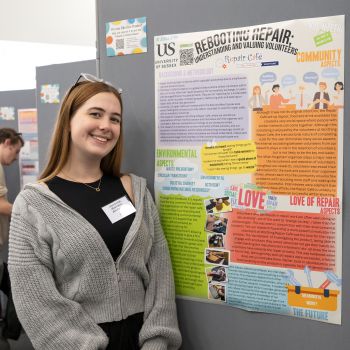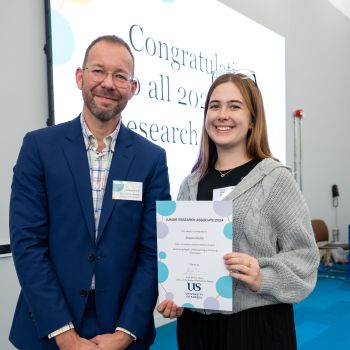University of Sussex Business School celebrates Junior Researcher achievements
By: Serena Mitchell
Last updated: Monday, 16 December 2024

Jess Grubb and her research poster

Jess Grubb and finalist research poster certificate

Dhruv Mandavkar's research poster
The University of Sussex Business School is proud to celebrate the outstanding achievements of its Junior Research Associates (JRAs) who participated in the Junior Research Poster Exhibition this Autumn. The JRA programme provides undergraduate students with a valuable opportunity to develop research skills and gain hands-on experience by working on real-world projects under the guidance of faculty supervisors.
Developing Key Skills Through Research
The JRA scheme goes beyond textbooks, equipping students with practical skills that are highly sought-after by employers. The JRA scheme aims to help undergraduates develop key research skills, such as planning a research project, critical thinking, academic writing, and creating an academic poster and presentation. Özgü Karakulak, PhD, Senior Lecturer, Strategy and Marketing co-ordinates the programme at the Business School. She said: “I’d like to offer my wholehearted thanks to all the faculty who have been voluntarily supervising students; this programme would not exist without their dedication.”
The culmination of the JRAs' hard work is showcased at the annual JRA Poster Exhibition. This event provides a platform for students to present their research findings to a wider audience and gain valuable feedback. All JRA posters were displayed this year, with a few finalists chosen for further presentation. The top two JRA projects are invited to attend the prestigious Posters in Parliament event. At the same time, all participants are encouraged to apply to the British Conference of Undergraduate Research (BCUR) to show their work on a national stage. This will be held at Newcastle University, 9 - 10 April 2025. The call for abstracts is now open and the deadline is midnight, Sunday 2 February 2025.
Understanding the Rise of Repair Cafes – Finalist Spotlight
Among the finalists was Jess Grubb, whose research focused on understanding the motivations of volunteers at the Worthing Repair Cafe, supervised by Prof. Ödül Bozkurt . "Our research was based on the community repair cafe within Worthing, which takes place on the last Saturday of each month," explained Jess. "We focused our research on understanding why there's been a rise in the number of repair cafes, with our current throw-away culture, but more importantly, who are the volunteers and why are they happily offering their free time to repair household items for the public, with absolutely no monetary incentive."
Jess' research examined the social, environmental, and intrinsic motivations that drive volunteer participation in repair cafes. "From our research, we found that environmentalism and the love of the repair process are strong motivations for the Worthing Repair Café volunteers," said Jess. "This highlights the need to value the volunteers' repair skills, share these skills throughout the community, and ultimately reboot the repair culture."
The implications of Jess' research extend beyond recognizing the valuable contribution of repair cafe volunteers. "As our environmental climate worsens," said Jess, "communities are becoming increasingly reliant on these voluntary initiatives. By having these community initiatives which enable like-minded people to come together, we're able to pass on skills that have been forgotten due to the throwaway culture that we live in. Harvesting repair skills in younger generations would then further reboot the love of the repair process in generations to come."
The JRA programme has not only equipped Jess with valuable research skills but has also ignited a passion for further academic exploration. "Completing the JRA has given me invaluable experience in research and academic poster design," shared Jess. "With my dissertation coming up this year, I believe having this understanding of how to conduct research will really aid me. It has ignited my passion for research, helping me decide to continue education after my undergraduate degree."
Understanding Crypto Regulations – JRA poster design
Dhruv Mandavkar, a third-year FinTech student, also highlighted his research on a poster "A Comparative Analysis of the Effectiveness of Crypto Regulations in the UK and EU Regarding Money Laundering." Dhruv's research looked at the intricate world of cryptocurrency regulation, comparing the approaches of the UK's FCA framework and the EU's MiCA regulation, supervised by Dr. Malgorzata Sulimierska
"This project was not just about academic exploration, it was a comprehensive learning journey," Dhruv shared. "From considering the nuances of regulatory frameworks to understanding how decentralized finance operates within the broader financial ecosystem, every step was a valuable insight."
Dhruv's research highlights the importance of effective regulation in the rapidly evolving cryptocurrency market. By gaining insights into the strengths and weaknesses of different regulatory approaches, researchers and policymakers can work towards creating a more secure and transparent financial ecosystem.
The University of Sussex Business School extends its congratulations to all the JRAs who participated in the programme, with a special recognition to Jess, Dhruv, and the other finalists and entrants for their outstanding research contributions. We look forward to seeing the continued success of our future research leaders.
